
The conflict in Nagorno-Karabakh has resulted in an intense competition between regional powers to expand their influence.
Erdogan has positioned Turkey to play a more central role in foreign affairs, a decision that has brought Ankara into conflict with other powers.
Iran aims to prevent any physical geographic changes and is also concerned about the potential for a rise in ethnic nationalism in the region.
By bringing both sides to the negotiating table to end the fighting, Moscow hopes to show its influence remains strong throughout its near abroad.
The conflict between Armenia and Azerbaijan in Nagorno-Karabakh has resulted in an intense competition for expanded influence between regional powers. Russia, Turkey, and Iran each maintain a keen interest in advancing their respective priorities, while denying advantages to their adversaries. ‘The Great Game: Caucasus Edition’ has played out against the backdrop of fierce military battles in Nagorno-Karabakh, where six weeks of clashes between Armenia and Azerbaijan have resulted in close to 5,000 casualties, according to Russian president Vladimir Putin. Since late September alone, Armenia lost 1,300 soldiers in the fighting. Azerbaijan’s more modern military, including its fleet of drones, proved decisive on the battlefield. Estimates of those displaced by the fighting range from 90,000 to upwards of 130,000 civilians. Earlier this week, Moscow mediated a three-way agreement signed by Putin, Armenian Prime Minister Nikol Pashinyan, and Azerbaijani President Ilham Aliyev. With Azerbaijani forces achieving significant gains on the battlefield, Armenia was forced into making painful concessions, including giving up small ethnic Armenian areas inside Azerbaijan and allowing the United Nations to supervise the return of internally displaced people. Pashinyan announced that he agreed to the deal after ‘a deep analysis of the military situation.’ This concession of defeat sparked outrage in Armenia’s capital, Yerevan, as protests erupted and angry mobs stormed government buildings.
From the start of the conflict, Turkey played a prominent role in supporting Azerbaijan. Under the leadership of Turkish President Recep Tayyip Erdogan, Turkey has positioned itself to play a more central role in foreign affairs, a decision that has brought Ankara into conflict with other global and regional powers, including France, Russia, and Iran. Turkey continues to flex its muscles in various theatres including the Levant, North Africa, the eastern Mediterranean, and the Caucasus, to name just a few examples. Still, Turkey’s more aggressive force posture is not without consequence. In late October, Russian airstrikes killed dozens of Turkish-backed Syrian fighters in northwestern Syria, in a replay of a similar incident earlier this year, sparking concerns over a broader conflagration. Turkish expansion in the Caucasus and Central Asia risks angering China, while Turkey’s purchase of the S-400 missile system from Russia has led to tensions with NATO. Turkey and France find themselves on opposite sides of the conflict in Libya, and Erdogan and French President Emmanuel Macron recently exchanged barbs over growing controversy in France related to the role of Islam in that country.
Iran is also concerned about Turkey’s growing ambitions and has sought to balance Ankara, in part by offering diplomatic support to Armenia. Iranian support to Christian Armenia instead of Shia Muslim Azerbaijan demonstrates just how concerned Iran is about a rise in ethnic nationalism. Approximately 40% of Iran’s population is comprised of ethnically Turkic Azeris. For its part, Tehran wants to avoid any physical geographic changes and recently conducted military exercises on its borders as a show of force. But the agreement brokered by Moscow does change some of the geography in the region. Particularly, a transport corridor will open through Armenia to the Azerbaijani region of Nakhichevan, and a new section of access road will be constructed near the town of Shusha, the second-largest town in the region which will change hands from Armenia to Azerbaijan.
Russia provides military assistance to Armenia and maintains a military base in the country. Many Armenians complained that Moscow could have done more to help, but Russia remains wary of becoming overly involved in the conflict. Earlier this week, Azerbaijan apologized for mistakenly shooting down a Russian military helicopter, killing two crew members. By putting an end to the fighting and bringing both sides to the negotiating table, Moscow hopes to show that its influence remains strong throughout its near abroad. Under the terms of the agreement, Russia will deploy peacekeepers to the disputed territory, including along the strategic mountain pass known as the Lachin Corridor, while Armenia will withdraw its army. Russian troops are slated to remain for five years in order to guard the line of contact and allow Armenians to travel along the road connecting Nagorno-Karabakh with Armenia. Turkey has agreed to run a joint monitoring center with Russia to oversee the cease-fire. There are concerns that Azerbaijan’s military victory will serve as an example to aggressors in other so-called ‘frozen conflicts,’ who may be tempted to move quickly, while many countries, including major powers like the United States, are preoccupied with responding to COVID-19 and domestic political issues.
 Eurasia Press & News
Eurasia Press & News



